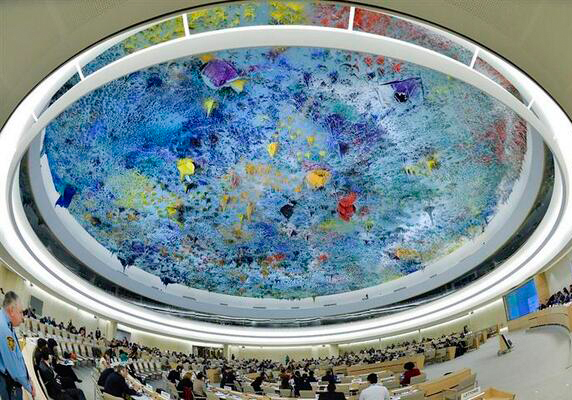
Sep 11, 2017 | Advocacy, Non-legal submissions
The ICJ today delivered an oral statement at the UN Human Rights Council, on the need for criminalisation and other effective measures against enforced disappearances in Asia.
The statement, which was delivered in an interactive dialogue with the Working Group on Enforced or Involuntary Disappearances, read as follows:
“Mr President,
The ICJ echoes the Working Group’s recommendation that States should criminalize all acts of enforced disappearance, including enforced disappearances of migrants, which should be punished by appropriate penalties, taking into account their extreme seriousness.
As noted in the recent ICJ publication, “No more ‘missing persons’: the criminalization of enforced disappearance in South Asia”, despite the region having some of the highest numbers of reported cases of disappearances in the world, enforced disappearance is not presently a distinct crime in any South Asian country.
This is a major obstacle to ensuring justice in cases of enforced disappearance.
In Southeast Asia, the ICJ has highlighted the failure of authorities to effectively investigate cases of alleged enforced disappearance in the absence of national laws criminalizing enforced disappearance, for example with respect to emblematic cases of Sombath Somphone in Lao PDR and Somchai Neelapaijit and Porlajee “Billy” Rakchongcharoen in Thailand.
Where there is no clear national legal framework specifically criminalizing enforced disappearance, unacknowledged detentions by law enforcement agencies are often treated by national authorities as “missing persons” cases.
On rare occasions where criminal complaints are registered against alleged perpetrators, complainants are forced to categorize the crime as “abduction”, “kidnapping” or “unlawful confinement”.
These categories do not recognize the complexity and the particularly serious nature of enforced disappearance, and often do not provide for penalties commensurate to the gravity of the crime.
They also fail to recognize as victims relatives of the “disappeared” person and others suffering harm as a result of the enforced disappearance, as required under international law.
Finally, the ICJ welcomes the Working Group’s migration study; we note that the ICJ Principles on the Role of Judges & Lawyers in relation to Refugees and Migrants, published earlier this year, includes key safeguards that could help prevent disppearances in this context.
Thank you.”
The statement is available in PDF format in English, in Thai and Laotian.
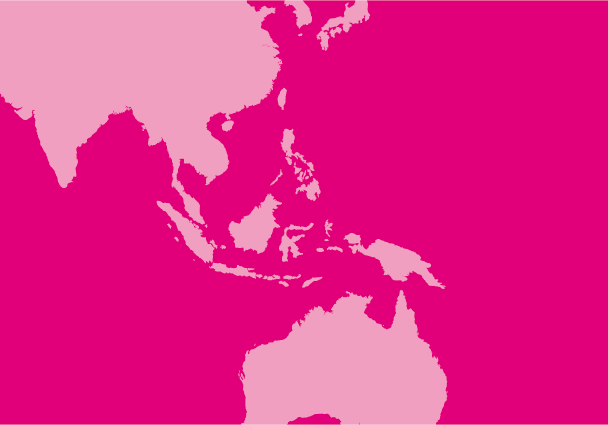
Jun 29, 2017 | Advocacy, News, Non-legal submissions
The ICJ, together with other 60 national and international human rights organizations urged today the Myanmar authorities, and in particular the Ministry of Transport and Communication and the Parliament, to ensure the repeal of the offence of criminal defamation.
Myanmar-JointStatement-CriminalDefamation-2017-ENG (joint statement in English)
Myanmar-JointStatement-CriminalDefamation-2017-BUR (joint statement in Burmese)
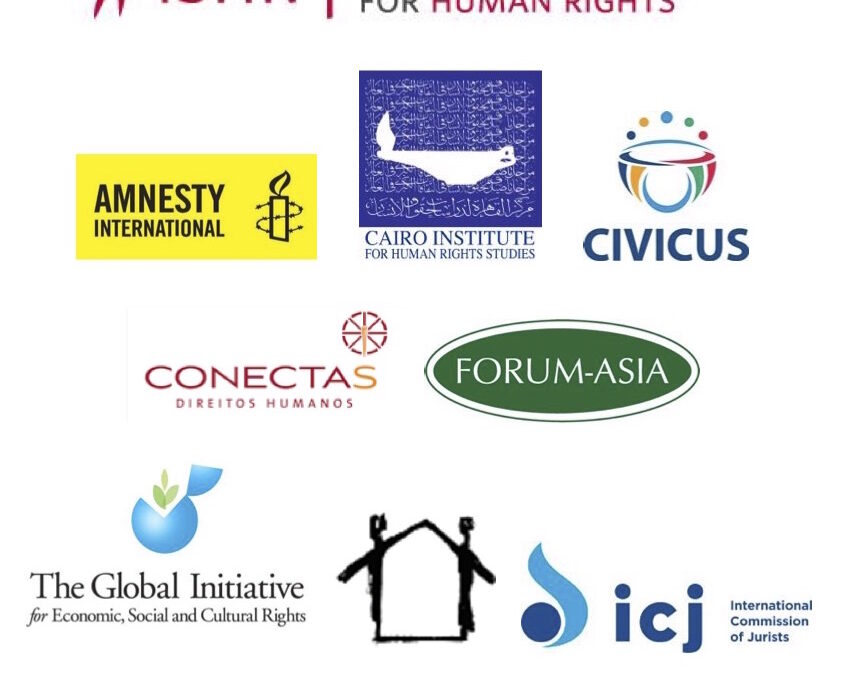
Jun 28, 2017 | Advocacy, Non-legal submissions
The ICJ has joined other leading human rights NGOs in setting out a range of specific measures to increase the effectiveness of UN Special Procedures – independent experts appointed by the Human Rights Council to address particular themes or countries.
The written submission was made in the context of the Annual Meeting of the Special Procedures, in Geneva.
Coordinated by the International Service for Human Rights (ISHR), the document assesses current practices against a range of recommendations made in an earlier joint civil society submission in 2016.
The 2017 submission welcomes progress on a number of the recommendations, but also highlights issues where little or no progress has been made. It also offers several new recommendations.
Among the positive developments are the enhanced role of the Coordination Committee, action taken to combat reprisals, the creation of a database where details of individual communications (i.e. complaints) can be accessed, and engagement of Special Procedures with international and regional forums.
The full 2017 submission, entitled “The Special Procedures: Developments in Institutional Strengthening and Working Methods”, can be downloaded in PDF format here: UN-Submission-AnnualMeetingSpecialProcedures-2017
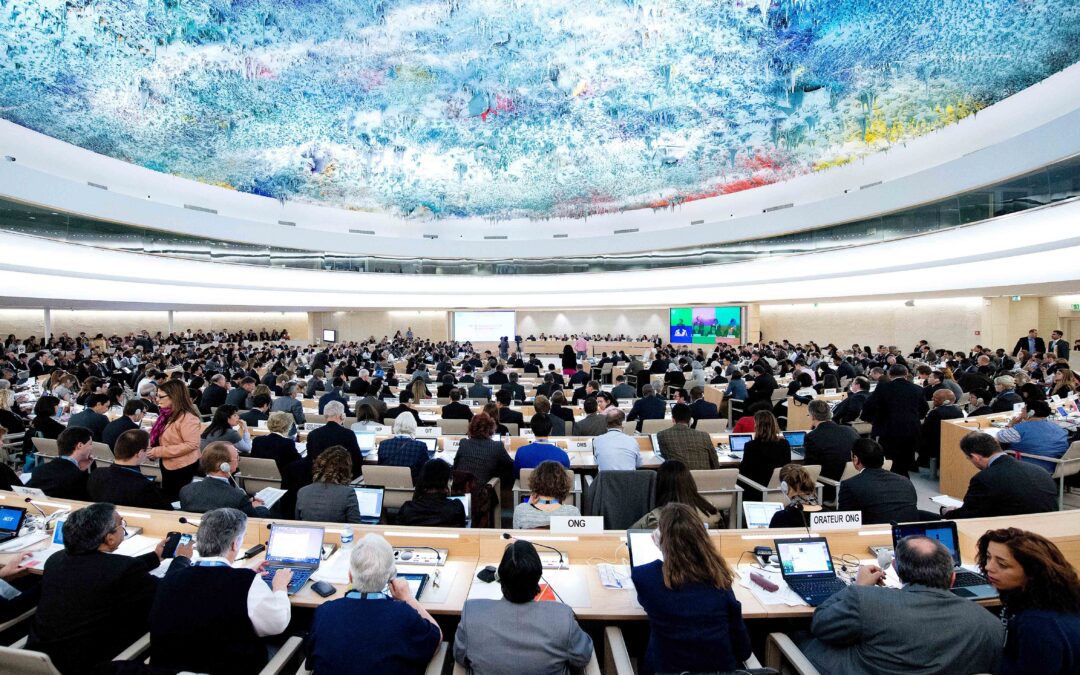
Jun 23, 2017 | Advocacy, Non-legal submissions
The ICJ has joined other NGOs in highlighting some of the achievements and failures of the June 2017 session of the UN Human Rights Council in a statement at the end of the session.
The statement, delivered on behalf of the group of NGOs by the International Service for Human Rights (ISHR), read as follows:
At the close of this session, we welcome the commitment by many States from all regions to enhance the Council’s success and effectiveness, and the performance of Human Rights Council (HRC) members through a series of concrete actions. The steps outlined by the Netherlands, such as more competitive HRC elections and the application of objective human rights based criteria to determine whether and how to act on situations of concern, would go a long way in making the Council more accessible, effective, and protective.
The leadership shown by States in the development of joint statements on killings in the Philippines‘ so-called ‘war on drugs’ and threats against human rights defenders, and on the increasingly dire situation in the Maldives are examples of this. We regret the lack of such leadership on other States including China and Egypt.
Although we’d hoped for a more robust response on the Democratic Republic of the Congo (DRC) from the Council, the international team of experts brings hope of uncovering the truth about the horrific violence in the Kasai. The UN, this Council, and the DRC itself must now ensure unhindered access for and support to the team, for it to independently produce a robust and credible report, which will constitute a step towards accountability.
We congratulate Cote d’Ivoire for its six years of cooperation with the UN and the mandate of the Independent Expert. We urge the Council to continue to pay attention to the human rights situation, particularly in the context of recent mutinies, and to assist the country in the implementation of the Independent Expert’s recommendations, including by striving for A-status for its National Human Rights Institution (NHRI).
We also echo the joint call by several States urging you to create a publicly accessible register of alleged acts of intimidation and reprisals and to provide short oral updates on cases at the start of every Item 5 general debate giving States concerned the opportunity to respond.
We also welcome the joint statement of the core group on civil society space together with some NGOs, and its reaffirmation that the “substantive participation of civil society makes this Council’s debates and work, including the UPR, richer and more meaningful”.
Mr President,
We are pleased that both resolutions on discrimination and violence against women were adopted by consensus, and that adverse amendments designed to remove language on comprehensive sexuality education and women human rights defenders were defeated. We regret that the Russian Federation and others systematically seek to remove reference to human rights defenders in all resolutions at each session. Denial of the existence of defenders is absurd, given the long history of formal recognition of the concept by the Commission on Human Rights, Council and General Assembly.
We regret that the resolution on the “protection of the family” fails to fully recognise that older persons are individual rights holders entitled to self-determination and autonomy, and ignores a significant UN process, the General Assembly Open-Ended Working Group on Ageing. The resolution also fails to acknowledge that diverse forms of the family exist. The entire initiative is implicated in an effort to subvert the aims of our human rights system and the universality of rights.
In closing, Mr President, we are dismayed at the lack of progress in terms of ensuring the most effective participation of civil society, in accordance with established rules and practice of the Council. Although symbolic, the massive reduction of reserved NGO desk space in this room is illustrative of this.
We are concerned about the lack of formal engagement by you and your Bureau with civil society, the absence of visible steps to curb and respond to intimidation or reprisals, and the abusive interruptions of NGO statements, including in some instances by the chair. And we look forward to engaging with your office to reverse this trend.
Thank you.
Among the NGOs joining the statement were the following:
- Amnesty International
- CIVICUS
- Human Rights Watch
- International Commission of Jurists
- International Lesbian, Gay, Bisexual, Trans and Intersex Association (ILGA)
- International Longevity Center Global Alliance
- International Platform Against Impunity
- International Service for Human Rights
The joint statement may be downloaded in PDF here: UN-HRC35-EndSessionStatement-2017
* For additional information on ICJ priorities and activities at the session, see the following:
Refugees and migrants: the role of judges and lawyers
Business responsibility to protect human rights
Corporate impunity; legal protection of refugees and migrants
Discrimination against women in access to justice
Threats to independence of judges and lawyers; backsliding on violence against women
Ensuring women’s access to justice for gender based violence
Turkey: judicial independence and freedom of expression
Civil society space in the Human Rights Council
Call for strong action on Egypt at the Human Rights Council
Continuing lack of accountability for rendition and secret detention
“Protection of the Family”: concerns regarding the resolution
UN Human Rights Council adopts resolutions on independence of judges and lawyers
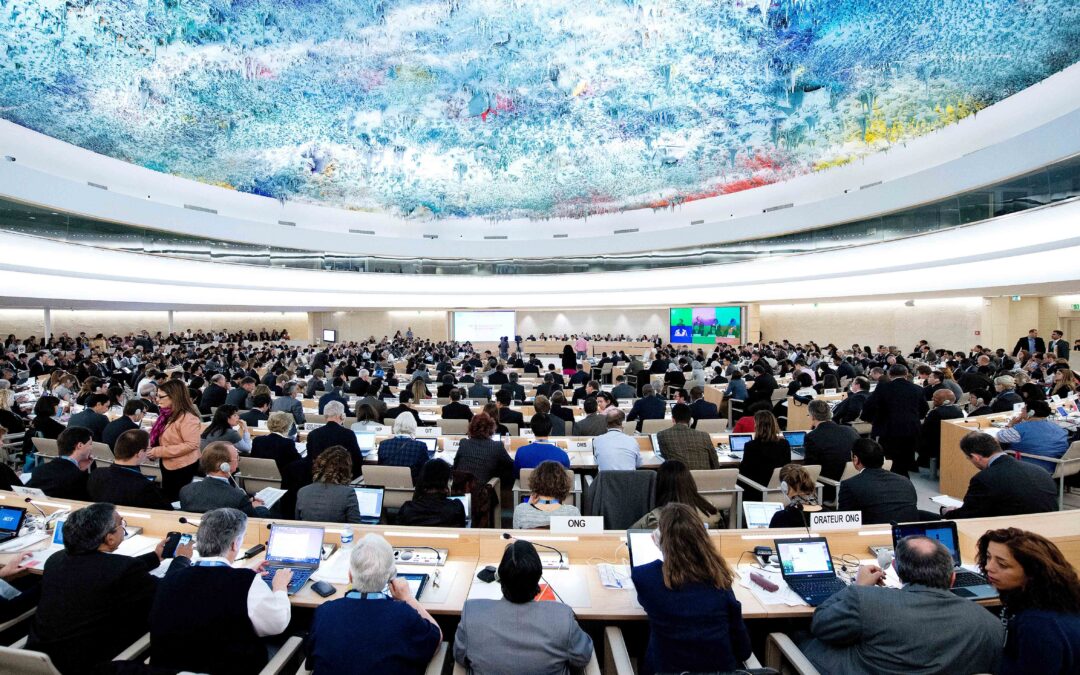
Jun 19, 2017 | Advocacy, Non-legal submissions
The ICJ has joined other NGOs in expressing concerns about the latest resolution on “protection of the family” currently under consideration by the Human Rights Council.
The statement, which was delivered by the International Humanist and Ethical Union during the Council’s general debate on Follow-up and implementation of the Vienna Declaration and Programme of Action (item 8), read as follows:
In the Vienna, States reaffirmed their commitment to the Universal Declaration of Human Rights. In that vein, we would like to express our strong concerns about the draft resolution on the protection of the family [A/HRC/35/L.21 on “Protection of the Family: Role of the family in supporting the protection and promotion of human rights of older persons.”]
Together with NGOs working on the rights of older persons, we highlight that this resolution reinforces ageist stereotypes, fails to adequately recognize older persons as individual rights holders and falls far short of States’ obligations to respect, protect and fulfil their rights. We reject its limited focus on ‘protection and assistance’ and failure to reflect research that the family is the primary site of violence against older persons. We also note that the resolution ignores the work of the Open-ended Working Group on Ageing and ignores the conclusions of the Independent Expert on the enjoyment of all human rights by older persons.
This resolution is one of a series of Protection of the Family resolutions that aim to subvert the universality of international human rights; stifle diversity and autonomy; and to shift rights protections away from family members, including older persons, into the institution of ‘the family’. We are concerned that the resolution attempts to instrumentalize older persons and their rights towards these ends.
We are also concerned by the resolution’s failure to recognize that various forms of family exist everywhere, and its stating that “the family plays a crucial role in the preservation of cultural identity, traditions, morals, heritage and the values system of society,” without recognising that families can perpetuate discriminatory and harmful values and traditions, particularly against older women. Culture and tradition are not static or homogeneous; we all have equal human rights to participate in and create culture. When powerful institutions attempt to claim ownership over, or enforce ‘authentic’ interpretations of culture, tradition, or values, individuals – particularly those who are marginalized or vulnerable – are denied their fundamental rights.
For these reasons, we do not believe this draft resolution is in line with human rights principles and standards and therefore call on the Core Group to withdraw it or for members of the Human Rights Council to amend or vote against it.
*Joining and supporting organisations:
Action Canada for Sexual Health and Rights
ARC International
Association for Women’s Rights in Development
Civil Authorize Negotiate Organization – Myanmar (C.A.N-Myanmar)
Coalition of African Lesbians
CREA
Federatie van Nederlandse Verenigingen tot Integratie van Homoseksualiteit – COC Nederland
HelpAge International
International Commission of Jurists
International Humanist and Ethical Union (IHEU)
International Lesbian, Gay, Bisexual, Trans and Intersex Association (ILGA)
International Longevity Centre Global Alliance (ILC GA)
OUtRight Action International
Sexual Rights Initiative
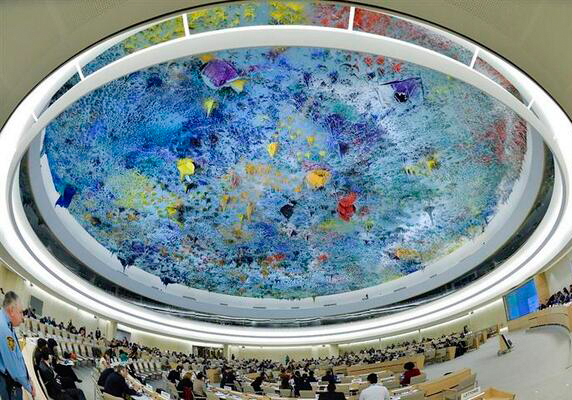
Jun 16, 2017 | Advocacy, Non-legal submissions
The International Commission of Jurists today drew to the attention of the Human Rights Council the failure of responsible States to ensure accountability for renditions and secret detention in several countries across the world.
The issue was highlighted by an oral statement in the General Debate on human rights situations that require the Council’s attention.
The ICJ statement continued as follows:
The US-administered rendition and secret detention programme of the last decade led to the commission of egregious violations of human rights and crimes under international law on a global scale with the complicity of several States, including in Europe.
Similar practices have been adopted in the Russian Federation where abductions of “terrorism” or “extremism” suspects and transfer to Central Asian States continue, in disregard of the principle of non-refoulement.
None of the States involved in the US-led renditions programme, or in abduction and transfer practices occurring in the Russian Federation, have ensured full accountability of those responsible and full redress for victims.
The ICJ calls on this Council to issue a strong call to all UN Member States to provide full accountability and redress for victims for the human rights violations that occurred during these operations.










